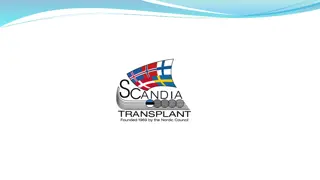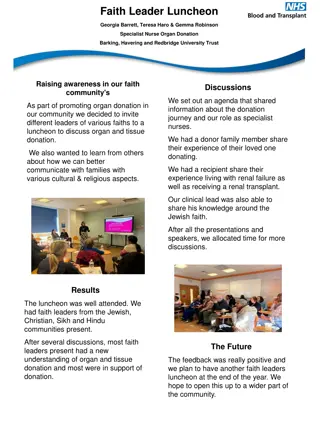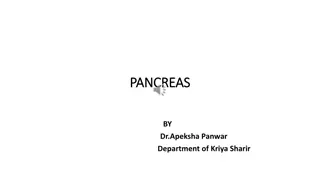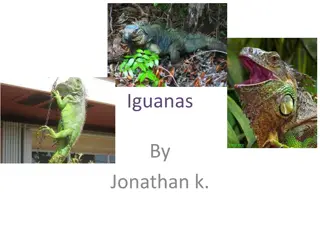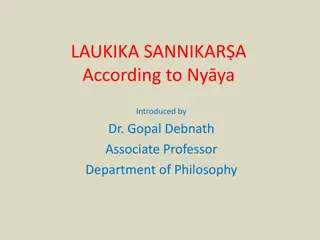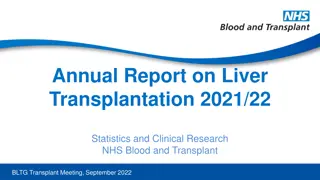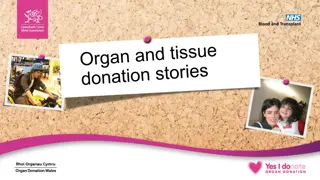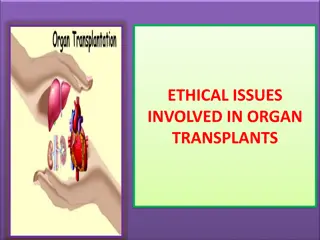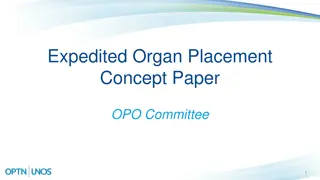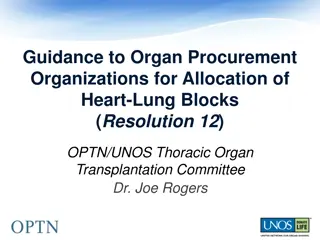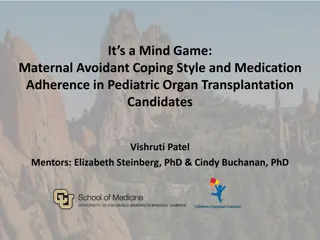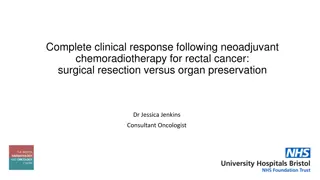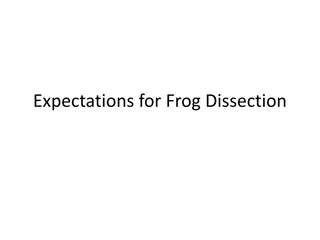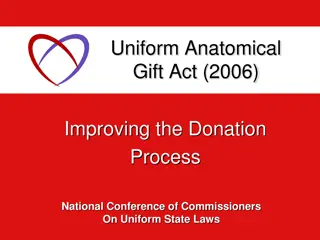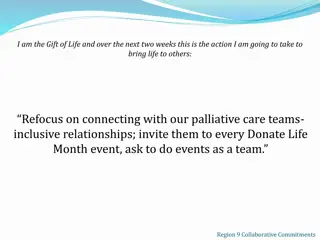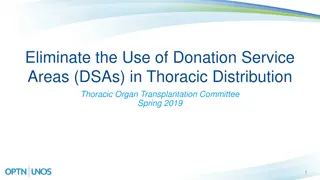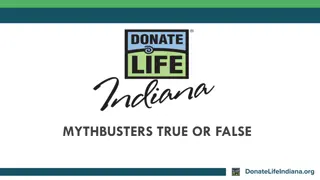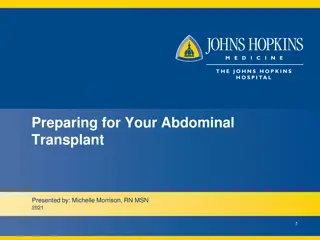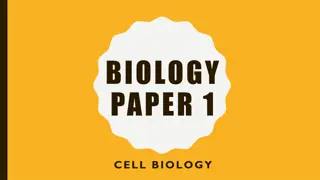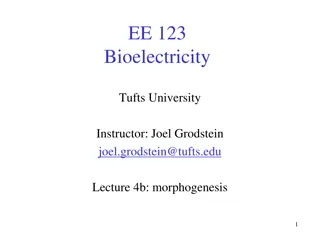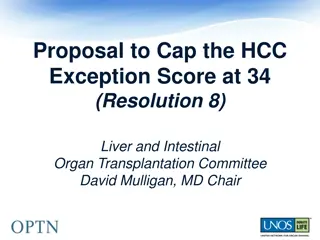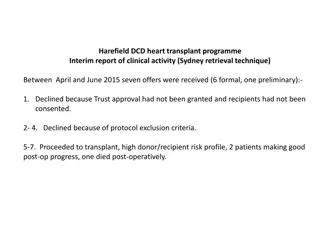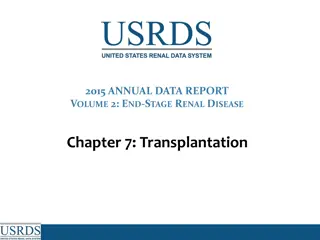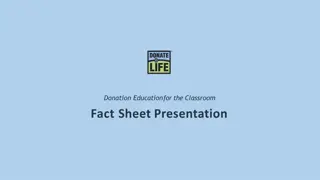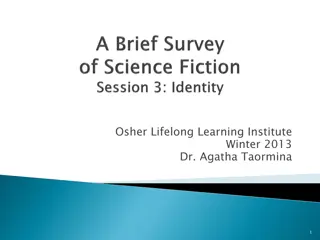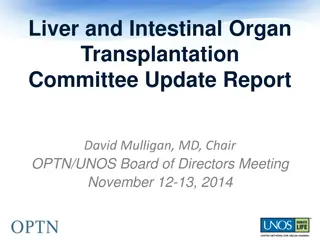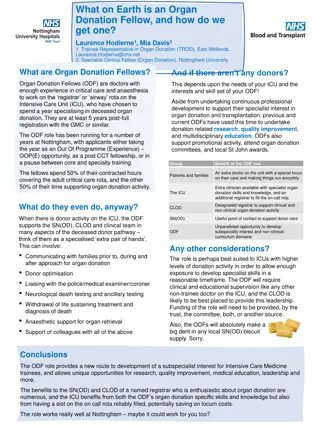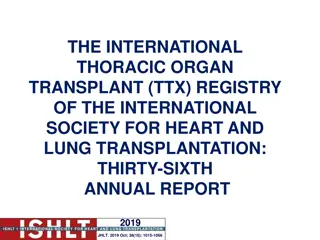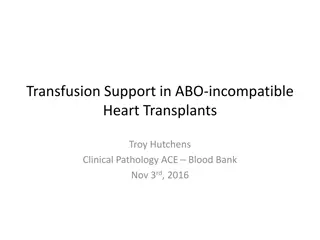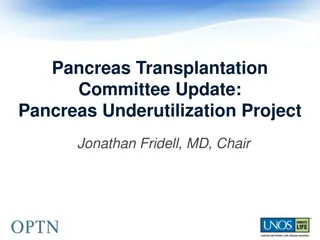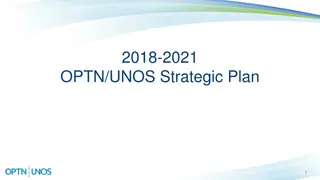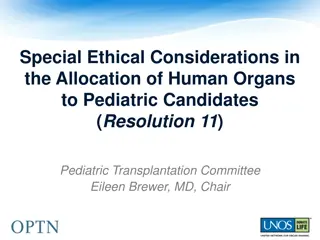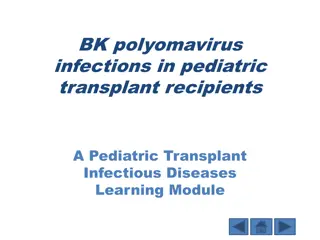Understanding Shock: Causes, Symptoms, and Stages
Shock is a critical condition caused by an imbalance between cellular oxygen supply and demand, leading to organ dysfunction. Compensatory responses include increased heart rate, vasoconstriction, and hormonal adjustments. Recognizable features of shock include tachycardia, hypotension, cool clammy
3 views • 27 slides
Should We Allow a Market for Transplant Organs?
Analyzing the dilemma of organ shortages in the US, this content explores the ethical dimensions of creating a market for transplant organs. Through discussions on economics, ethics, and decision-making processes in allocating scarce organs, it delves into the complexities of determining who should
0 views • 22 slides
Understanding Organ Donation in Hong Kong
Explore the various aspects of organ donation in Hong Kong, including suitable organs for donation, living and cadaveric donation processes, low donation rates, common misconceptions, and how to register as an organ donor through the Centralised Organ Donation Register. Discover the opt-in and opt-o
3 views • 28 slides
Scandiatransplant Activities and Awards in 2023
Scandiatransplant is the organ exchange organization serving Denmark, Finland, Iceland, Norway, Sweden, and Estonia. They facilitate kidney, liver, thoracic, pancreas, and islet transplantations. The organization aims to maintain transparency and ethical practices while operating a common waiting li
2 views • 45 slides
Engaging Our Community: Organ Donation Initiatives and Success Stories
Two impactful initiatives in the healthcare sector aimed at promoting organ and tissue donation within communities are highlighted. The first initiative involves hosting luncheons with faith leaders to educate and raise awareness, resulting in increased support for donation. The second initiative sh
0 views • 4 slides
Comprehensive Overview of Pancreas Function and Structure
Pancreas is a vital organ in the abdomen with dual exocrine and endocrine functions. As an exocrine organ, it secretes digestive enzymes and bicarbonates into the duodenum for food breakdown. In its endocrine role, the pancreas regulates blood sugar levels by secreting insulin, glucagon, somatostati
1 views • 16 slides
Fascinating Facts About Iguanas: From Skills to Survival
Iguanas, part of the Iguanidae family, are unique reptiles with special skills like tree climbing and predator evasion. They face threats due to human consumption and environmental hazards, such as oil spills for marine iguanas. Their sensory organ, Jacobson's organ, helps them navigate their surrou
0 views • 10 slides
Effectiveness of Steroids in COVID-19 Treatment: Insights from Recent Studies
Recent studies delve into the impact of different steroids on mortality and organ support in hospitalized COVID-19 patients. The use of dexamethasone showed a significant reduction in 28-day mortality, especially in patients requiring oxygen support. On the other hand, the REMAP-CAP trial assessed t
1 views • 6 slides
Understanding Perception in Nyaya Philosophy: An Introduction to Laukika Sannikara
Nyaya philosophy defines perception as knowledge arising from the contact between a sense organ and its object, known as Sannikara. This contact can be direct or indirect, leading to various kinds of Sannikaras such as Sayoga, Sayokta-samavya, Samaveta-samavya, Samavya, and Viśeṣa-viśeṣabhāva
2 views • 10 slides
Liver Transplantation Report 2021/22 Statistics & Research Findings
The Annual Report on Liver Transplantation 2021/22 presents detailed statistics and clinical research findings from the NHS Blood and Transplant BLTG Transplant Meeting in September 2022. The report covers an overview, transplant list, donor and organ supply, transplant activity, and outcomes. It hi
1 views • 45 slides
Organ Donation Awareness and Education Activities
Explore the importance of organ donation through engaging activities, such as quizzes on organ and tissue donation facts and myths. Learn about the various organs and tissues that can be donated, the significance of registering on the NHS Organ Donor Register, and the impact of organ donation in sav
1 views • 26 slides
Ethical Issues in Organ Transplants
Organ transplantation involves the moving of organs from one body to another to replace damaged or absent organs. The process includes cadaveric and living organ donations, with various transplantable organs like lungs, kidneys, heart, and more. There are ethical issues surrounding organ donation de
0 views • 16 slides
Expedited Organ Placement Concept Paper - Addressing Critical Transplant System Issues
This concept paper outlines a proposal to address key challenges in the current organ transplant system, such as lack of transparency and consistency in organ placement. The focus is on developing an expedited placement system with specific triggers and qualifications to improve access to organs for
0 views • 9 slides
National Histopathology Service for Organ Retrieval and Transplantation - Audit Findings
The need for a national histopathology service for organ retrieval and transplantation is highlighted, with a focus on the importance of histopathological analysis in assessing donor organ quality and identifying lesions for further investigation. The audit findings show the incidence of urgent hist
0 views • 17 slides
Enhancing Heart-Lung Allocation Policy for Organ Transplantation
This project focuses on improving the allocation of heart-lung blocks for organ transplantation by providing clear guidelines to Organ Procurement Organizations (OPOs). The goal is to ensure consistent practices among OPOs across the country, promoting fairness and efficiency in organ allocation. Th
0 views • 11 slides
Understanding Maternal Avoidant Coping and Medication Adherence in Pediatric Organ Transplant Candidates
Maternal avoidant coping styles may impact medication adherence in pediatric organ transplantation candidates. Challenges in the field include organ shortage, patient non-adherence, and identifying health risk factors for effective organ allocation. Parents' coping behavior factors of stress include
0 views • 14 slides
Comparison of Surgical Resection vs. Organ Preservation after Neoadjuvant Chemoradiotherapy for Rectal Cancer
In the management of rectal cancer, the debate between surgical resection and organ preservation after neoadjuvant chemoradiotherapy is ongoing. While surgical resection is highly effective, the watch-and-wait strategy offers benefits such as avoiding permanent stomas and improving quality of life.
1 views • 14 slides
Frog Dissection Expectations and Procedures
Instructions for a frog dissection including preparation, tool usage, cutting techniques, organ exploration, and cleanup procedures. Students are guided on safety measures, dissection methods, organ identification, and proper cleanup steps after the activity. Detailed visual aids accompany each step
0 views • 6 slides
Modernizing Organ Donation Laws: The Uniform Anatomical Gift Act of 2006
The Uniform Anatomical Gift Act (UAGA) of 2006 aims to enhance the donation process by introducing new definitions, emphasizing personal autonomy, and providing clearer rules. It addresses the need for uniformity, updates to reflect current practices, and modernizes the Act to ensure a smoother orga
0 views • 14 slides
Understanding Organogenesis in Plant Tissue Culture Techniques
Plant regeneration through tissue culture techniques such as organogenesis plays a vital role in micropropagation and organ production. Factors affecting organogenesis include donor plant growth, culture medium, growth regulators, and environmental conditions. Chemical regulation and the use of epid
0 views • 10 slides
Bringing Life Through Organ Donation: Two-Week Action Plan
Over the next two weeks, the Gift of Life aims to refocus on connecting with palliative care teams, educate ICU staff on the importance of early referrals, raise awareness in the Caribbean community about organ donation, coordinate information sessions with OPO liaisons, and encourage colleagues to
0 views • 64 slides
Proposal to Remove Donation Service Areas in Thoracic Organ Transplantation
The proposal aims to ensure compliance with regulations by eliminating Donation Service Areas (DSAs) in thoracic organ allocation policies. The suggested solutions involve replacing DSAs with a 250 NM distance from the donor hospital, removing language allowing prioritization of sensitize heart cand
0 views • 10 slides
Organ Offer Management at Keck USC Transplant Institute
Keck USC Transplant Institute is a multi-organ transplant center with a dedicated team managing organ offers. The team structure includes RN-Transplant Coordinators, Call Team Managers, and Donor Allocation Specialists. They handle a range of tasks from reviewing offers with physicians/surgeons to p
0 views • 18 slides
Organ Donation and Transplantation Myths True or False
Explore common myths and facts about organ donation and transplantation through a fun true or false game. Learn the truth behind misconceptions like who can be a donor, the possibility of brain transplants, where to register as a donor, fairness in organ allocation, and the impact on funeral arrange
1 views • 14 slides
Comprehensive Guide to Kidney Transplant: Preparations, Benefits, and Risks
Explore the essential aspects of kidney transplantation, including the significance of kidneys, types of abdominal transplants, fast facts about kidney transplants, benefits, risks, and the kidney transplant waitlist process. Gain insights into the importance of kidney health, the waiting list stati
0 views • 21 slides
Cell Biology Overview and Organ Systems in Biology Paper 1
The Biology Paper 1 content covers topics such as cell specializations, cell division, organelles, enzyme functions, and organ systems including the cardiovascular system. It discusses key concepts like stem cells, mitosis, diffusion, osmosis, active transport, and various cell components such as nu
0 views • 8 slides
Exploring Bioelectricity and Regenerative Medicine in Morphogenesis
Delve into the fascinating world of bioelectricity, regenerative medicine, and morphogenesis as discussed by Joel Grodstein in EE.123 at Tufts University. Discover the origins of bioelectricity, its relevance in neuronal functions, cardiac bioelectricity, and its role in morphogenesis. Explore the p
0 views • 53 slides
Proposal to Cap the HCC Exception Score at 34 for Liver and Intestinal Organ Transplantation
Share 35 policy implemented to direct livers to high-risk patients, but liver offers are going to candidates with lower risk. This proposal aims to prioritize candidates most in need of liver transplants by capping the HCC exception score at 34.
0 views • 11 slides
Interim Report of Harefield DCD Heart Transplant Programme Clinical Activity
The interim report highlights the clinical activity of the Harefield DCD Heart Transplant Programme, showcasing the feasibility of DCD heart transplantation using various methods. The report discusses donor/recipient risk profiles, feedback from medical teams, and the potential impact on national tr
0 views • 7 slides
Analysis of Kidney Transplant Trends in End-Stage Renal Disease Patients (1996-2013)
This report delves into the trends surrounding kidney transplants in end-stage renal disease (ESRD) patients from 1996 to 2013. It looks at the percentage of dialysis patients wait-listed, unadjusted kidney transplant rates, number of patients wait-listed for kidney transplants, transplant counts, p
0 views • 33 slides
Organ, Eye, and Tissue Donation: Facts and Education for the Classroom
Explore essential information on organ, eye, and tissue donation, including common questions, the impact of donation, and how to register as a donor. Learn about the waiting list for transplants, the significance of eye donation, and the process of becoming a donor to save lives. This fact sheet pre
0 views • 11 slides
Exploring Human and Animal Consciousness in the Modern Era
Delve into the intricacies of human and animal consciousness, examining topics such as sentience, medical interventions, transplants, cyborgs, genetics, and the presence of consciousness in non-human animals. Discover how advancements like transplants, prosthetics, and scientific conclusions challen
0 views • 33 slides
Liver and Intestinal Organ Transplantation Committee Update Report
This report, presented by Dr. David Mulligan at the OPTN/UNOS Board of Directors Meeting in November 2014, discusses the strategic plan to increase access to transplants, focusing on liver transplantation prioritization based on need. Data from two eras show trends in deceased donor liver transplant
0 views • 14 slides
Understanding the Role of Organ Donation Fellows in Intensive Care Units
Organ Donation Fellows (ODFs) are experienced doctors specializing in deceased organ donation, spending time on the ICU rota and supporting organ donation activities. They assist in donor optimization, communication with families, and organ retrieval, benefiting both ICU patients and the healthcare
0 views • 4 slides
The International Thoracic Organ Transplant Registry Report 2019
The International Thoracic Organ Transplant Registry of the International Society for Heart and Lung Transplantation published its Thirty-Sixth Annual Report in October 2019. The report includes data from major contributors to the registry, acknowledgments to those involved, the TTX Registry Steerin
0 views • 46 slides
ABO-Incompatible Heart Transplants: History, Rationale, and Outcomes
ABO-incompatible heart transplants have become a crucial option due to limited pediatric organ donors. The rationale behind such transplants includes the development of antibodies post-6 months. Despite detectable donor-specific isohemagglutinins, successful outcomes have been achieved. Current crit
0 views • 17 slides
Pancreas Transplantation Committee Update: Addressing Underutilization
The Pancreas Transplantation Committee, led by Dr. Jonathan Fridell, aims to increase the number of transplants by investigating reasons for the reduction in pancreas transplants. They have made updates to the facilitated pancreas allocation policy and process, analyzing longitudinal trends from 200
1 views • 11 slides
OPTN/UNOS Strategic Plan: Enhancing Transplants and Patient Outcomes
The strategic plan for OPTN/UNOS (2018-2021) focuses on increasing the number of transplants, promoting equity in access to transplants, improving patient outcomes, enhancing safety, and efficient management. It outlines initiatives like dynamic donor/recipient matching, collaborative improvement me
0 views • 18 slides
Ethical Considerations in Pediatric Organ Allocation
Addressing the lack of an ethical framework for pediatric organ allocation, this project aims to provide evidence-based support for prioritizing pediatric candidates. By collaborating with experts and committees, the goal is to establish a permanent framework that respects ethical and clinical judgm
0 views • 11 slides
Understanding BK Polyomavirus Infections in Pediatric Transplant Recipients
Explore the significance, pathogenesis, diagnostic work-up, and therapeutic approach to BK virus infections in pediatric bone marrow and solid organ transplant recipients, with a focus on kidney transplants. Learn about susceptibility factors, causes of immunocompromise, and specific antiviral treat
0 views • 58 slides



